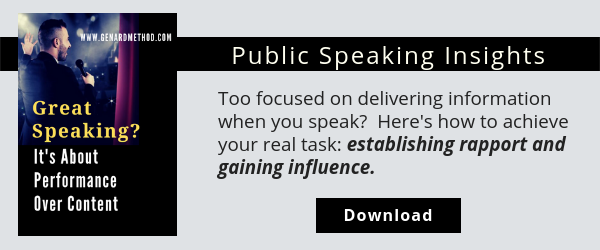Is your voice as powerful as you'd like it to be for public speaking? Here are three effective techniques for boosting your vocal presence.
There are many fascinating aspects of the human voice as it relates to public speaking.
Among these are the fact that your voice is the most flexible and dynamic instrument you own for public speaking performance. Your voice is the tool that ultimately lends your message meaning, immediacy, relevance, passion, and often, urgency.
If you want to move others when you speak, you need to focus on your vocal delivery. Discover the five essential techniques that will make your voice come vibrantly alive for your listeners and lead them to action. Download my essential cheat sheet, "5 Key Tools of Vocal Dynamics."
What If You Don’t Have a Powerful Speaking Voice?
It isn't everyone who can command attention just with his or her voice, however. Not everyone has the gift of a voice that can shake the rafters when the soul-stirring moments of a speech or presentation call for it.
I thought of this recently while I was training a corporate leadership team. One member of the team was soft-spoken. The fact that she was in finance and was faced with making dry content interesting, added to her challenge.
As always when I train anyone who needs more vocal power, I addressed the issue not as one of loudness, but in terms of energy. The form of energy that excites the vocal folds or vocal cords is exhaled air. Creating a stronger voice, then, often depends in part on increasing the volume of air, so there is enough to sufficiently power those vibrating muscles in the voice box.
If you are a soft speaker yourself and need to increase your vocal power, try this simple experiment: Tell yourself to amp up your volume by speaking louder in your throat. Listen to the difference in the sound you make, i.e., the quality of your voice compared to when you were speaking at your habitual volume.
Now speak again, this time concentrating on increasing the amount of energy you generate to reach the people in the last row. Did you notice how in the first instance (trying to increase your volume) your voice became harsher? And in your second attempt (boosting your energy level), didn’t you achieve a more powerful sound without adversely changing your vocal quality? Here's more on how to develop a warmer and more pleasant voice.
The Focus on Vocal Mechanics Can Be an Enemy of Effective Public Speaking
You’ve just learned two important lessons through that experiment. First you’ve discovered a simple yet effective way to improve your vocal power without creating a harsher sound. And second, you’ve just practiced an essential aspect of successful public speaking: focusing on your audience’s response rather than the mechanics of your public speaking performance.
We’re all exposed to prescriptions about what we need to think and do to be a good public speaker. But focusing on mechanics rather than the essence of communicating effectively with people sends you down the wrong road. In fact, here's why some of the popular "public speaking rules" may worsen your performance.
How to Be an Effective Public Speaker and Move Audiences
The foundation of influential public speaking doesn’t rest on prescriptive rules of behavior. It consists instead of the dynamic that plays out in all public performance: theater, dance, music, opera, poetry readings, and mimes exhibiting their magic on street corners. The ability to engage and entertain an audience—to change people's lives in ways large or small—is the essence of your public speaking performance.
Can you imagine achieving that result while focusing on the mechanics of your vocal production? By all means, use your practice and rehearsal time to improve the power or pleasantness of your voice. But in the real moment, give all of your attention to the needs and attentiveness of your audience, speaking to their needs as you perceive them.
What I’m really saying here is this: Don’t think of doing anything with your voice as you're trying to deliver your message as powerfully as possible. Intead, think of what you’re feeling, and how you can get that across. Your voice will immediately respond to that desire. If you’re really on this wavelength, you may not even be aware of what you’re doing vocally moment to moment.

Emotions Are the Heart and Soul of Vocal Power in Public Speaking
As the discussion above shows, the power of your voice ultimately depends not so much on mechanics, as it does your ability to connect with listeners. Urgently conveying a message to others who share your passion or commitment to that content is, indeed, an avenue to power as a speaker.
As surprising as that knowledge may be, is the fact that you need to invest as much in emotions as the verbal content of your presentations. Emotions rule when it comes to persuading and activating audiences, since the more important the decision any of us makes, the more that decision will be colored by emotion. Here are 5 ways to achieve emotional power in speeches and presentations.
As speaker, your response must be no less emotional than your audience. In fact, if you're reading this article, you’re already emotionally invested in your public speaking performances. Why else would you care if you achieve a powerful speaking voice as a presenter?
How Our Body Language Reflects Our Emotions
Here, it’s helpful to remember the nature of how we ourselves respond to emotions. What we feel usually finds an outlet in what we show physically. When we’re truly sad, we cry; when we’re happy, we smile. The voice, which is produced physically, is no less a player in this equation than any other aspect of body language. So allow yourself to feel and express the emotions that inform what you’re saying (business speakers often resist this level of commitment).
Your voice—so perfectly designed to respond to what you’re thinking and feeling—will reflect the deep investment you have in what you’re saying. And it will do so automatically and without any conscious thought. Again, your focus on what your listeners receive will serve you far better in your actual performance, than an approach that involves consciously aiming for an effect.
The late great Yogi Berra said you can’t think and hit at the same time. And in a sense, it’s equally true that you can't think and speak at the same time. But you’d better be playing your emotions if you want to speak with honesty and power.
You should follow me on Twitter here.



